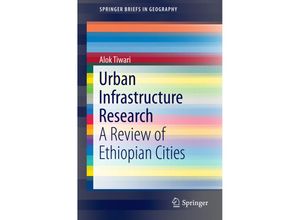This bookreviews contemporary research on urban infrastructure in 76 Ethiopian cities.It
examines urban infrastructure issues in these cities and covers a wide rangeof topics from
sustainability and smart cities to research methods employed byurban infrastructure
investigators with regard to Ethiopian cities. Research onurban infrastructure legitimacies and
modalities has established its valueworldwide in recent years though it is still fairly young
in the Ethiopiancontext. The first chapter outlines ongoing issues of debate concerning
urbaninfrastructures including but not limited to discourses on sustainability smartcities
innovative financing methods and potential partnerships. Urbaninfrastructure issues in
Ethiopian cities are examined in the second chapter whilethe third chapter presents a review
of the most relevant literature forresearchers. Findings show that the citations in the
research reports aremainly from the materials available over the internet including WHO
UN-Habitat and unpublished local materials. The fourth chapter identifiespatterns in the
findings and recommendations of the research reports discussed.The results reveal that there is
a wider gap between supply and demand withregard to urban infrastructure in Ethiopian cities a
situation that is furtheraggravated because of the growing urban population and already
existingbacklogs. The fifth chapter reviews the essential methods employed by
urbaninfrastructure investigators in Ethiopian cities. In this regard the cross-sectionalstudy
method with the use of survey method has been broadly adopted amonginvestigators. Lastly the
book presents a summary and recommendations. It was observed that theurban infrastructure boom
in Ethiopia is primarily concentrated in the keycities and the current pattern of urban
infrastructure provision does notincorporate the notion of sustainability. Hence the book
calls for setting theagenda of future research on urban infrastructure and services in
Ethiopiancities together with the universities private sector and government who
shouldideally collaborate to produce the knowledge needed to improve quality of life welfare
productivity and economic growth.



